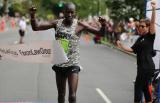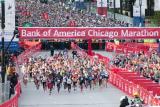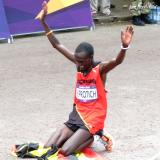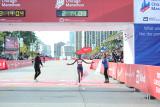Folders |
American Men and Women Making Big Strides in the MarathonPublished by
Chicago Marathon Gives Big Boost to American Marathon Performances in 2019By Adam Kopet It has been a good year for American marathoners so far with the Chicago Marathon providing a great display of what Americans are capable of in the longest running event in the Olympics. This year there have been 14 men who have run under 2:12 and 14 women who have run under 2:30. That is the best depth the U.S. has shown going back to 2008. In that span, the men saw nine athletes achieve a sub-2:12 marathon in 2012. Last year, the women had 10 women run under 2:30. There are multiple factors that can be attributed to the recent marathon success of U.S. marathoners. First and foremost could be the new Olympic standard. The IAAF has made Olympic standards more difficult across the board, but the hurt may be most felt in the marathon. The time standard was set at 2:11:30 for the men and 2:29:30 for the women. Americans were initially left chasing the standard, as the only other way to achieve the standard was high finishes at Abbott World Marathon Majors races and IAAF Gold Label road races. In the case of Emma Bates, who won the 2018 USATF Marathon Championships at the California International Marathon in her marathon debut, she felt she needed the Olympic standard going into February's U.S. Olympic Trials marathon. That led her to Chicago, as her previous marathon did not qualify her for the U.S. team for the IAAF World Outdoor Championships. That need to run a fast time also led some athletes to compete in marathons overseas. Aliphine Tuliamuk, Roberta Groner and Noah Droddy all ran at the fast Rotterdam Marathon in the Netherlands. The plan paid off for Tuliamuk and Groner, who both achieved the time and place standard to make them Olympics eligible. Droddy, however, found himself caught up in trying to run fast and in a bad place mentally. He ran 2:19 and missed the Olympic standard. It was not until late July that the IAAF granted the U.S. Olympic Trials marathon Gold Label status. That meant the top-three athletes across the finish line would have the Olympic standard, regardless of whether they had it before or ran fast enough on the day. That announcement, however, came too late for many athletes. Bates and other athletes had already begun their marathon build-up for a fall marathon. For many, the Chicago Marathon became the preferred race. It came early enough in the schedule to still allow athletes time to recover and prepare for the Trials. Chicago is also fast enough where the Olympic standard could be achieved. However, come race day in Chicago, the pressure to hit a specific time had been removed from the Americans. Yes, they wanted to run fast, but achieving the Olympic standard was not something they had to worry about anymore. That may be a reason why Sunday proved to be such an important day for U.S. marathoners. Of the 14 men who have run under 2:12 this year, 10 did so in Chicago. Matt Baxter of the HOKA ONE ONE Northern Arizona Elite performed the pacemaking duties for the Americans. Jacob Riley, who finished ninth, praised Baxter for his superb pacing after the race. Riley narrowly finished as the top-American, running a big personal best of 2:10:36 after three years of injury and 2018 surgery on his Achilles' tendon. Jerrell Mock finished just behind Riley, running 2:10:37 in his marathon debut. In all, four Americans ran 2:10, the first time that had happened in a single race.
For Droddy, he finally felt like he was racing from a place of comfort. He had the support around him, in a city he was familiar with, where he could succeed. The former NCAA Division 3 runner has struggled to make the transition to the marathon. He ended up taking more than four minutes off his personal best, running 2:11:42. After the race, he tweeted about playing with house money/
The Chicago Marathon not only helped the U.S. men run fast, but it brought the U.S. top-10 average down to 2:10:42. That is the fastest average since 2012 and there is still more than two months left to the year. Although the likelihood of additional athletes lowering that average is low, given the hilly nature of the New York City Marathon course and the approaching Olympic Trials race. Even more impressive may be the fact that average marathon time does not include a time from Galen Rupp. Rupp has been the U.S. leader for the past three years, but after surgery last year, he has not returned to full form. He raced the Chicago Marathon, but he dropped out just before 23 miles with calf tightness. Scott Fauble owns the fastest time in the nation this year at 2:09:09 from the Boston Marathon. The U.S. women have been on the rise for several years. Shalane Flanagan won the 2017 New York City Marathon. Des Linden followed that by winning the 2018 Boston Marathon. Behind them have been a growing list of marathon capable athletes taking a shot at the distance. Those years saw U.S. top-10 averages of 2:26:55 ad 2:26:53, respectively. This year has taken those heights to new levels. The top-10 average so far this year is 2:25:36, more than a minute faster than last year. It ranks the U.S. fourth in the world, according to Japan Running News.
The Chicago Marathon played less of a role in the U.S. top-10 performers, adding two names to the list, but there was still plenty to cheer about on the streets of Chicago Sunday morning. Five Americans finished in the top-10 of the race. Bates led the way, running a sizable personal best in 2:25:27, finishing fourth. The top-10 list does not include Flanagan, who had knee surgery earlier this year, and Amy Cragg, who ran under 2:22 last year. Both women ran the 2016 Olympic marathon, along with Linden. This year the women's leader is Sara Hall. She ran 2:22:16 last month, finishing fifth at the Berlin Marathon. She is scheduled to be back in action next month at the New York City Marathon. The Olympic Trials marathon could be one of the best races we have seen in a long time with more than a handful of athletes with winning potential. Parker Stinson, who ran 2:10:53 in Chicago, said, "I think it just got a whole lot more interesting after today." That is true for the men and the women. More news |








